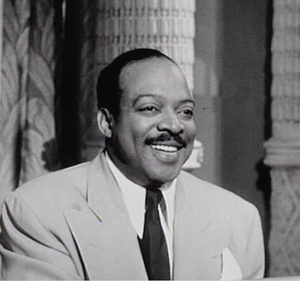
Count Basie
It was on this date, in 1904, that Count Basie was born. He was a Black jazz pianist, organist, bandleader, and composer.
Born in Red Bank, N.J., William Basie played drums as a child before taking up piano. In 1924, Basie moved to New York City, where he was influenced by the ragtime-derived style of Harlem jazz pianists and began touring on the vaudeville circuit as an accompanist. When a tour collapsed in 1927, stranding him in Kansas City, MO, Basie secured work playing the theater organ for silent movies. In 1929, Basie joined the Kansas City Orchestra of pianist Bennie Moten.
After the death of Moten in 1935, Basie formed a new band called Count Basie and His Barons of Rhythm with several members of Moten’s band. The band moved to New York City a year later and began recording as Count Basie and His Orchestra.
Widely regarded as one of the most influential jazz bandleaders of his time, Basie led his popular Count Basie Orchestra for almost 50 years. He also helped many influential musicians become prominent under his direction, including tenor saxophonists Lester Young and Herschel Evans, trumpeters Buck Clayton and Harry "Sweets" Edison, and singers Jimmy Rushing and Joe Williams. Basie's theme songs were "One O'Clock Jump" and "April In Paris."
Basie’s band of the late 1930s was dominated by great soloists performing in a two-handed ragtime style, then switching to a relaxed, spare style that led beautifully into the solos of his instrumentalists. Musical arrangements of the early Basie band were written relatively straightforwardly compared to the more intricate scores of other bandleaders.
After World War II ended in 1945, changes in the economy and Americans’ musical tastes sent most big bands into commercial decline. Eventually, the change affected Basie, and in 1950, he was forced to dissolve his large ensemble. He toured with a small group of six to nine players for a time, but by 1952, he had reassembled his big band. Whereas the earlier band emphasized the sound of the soloists over that of the ensemble, the later band favored the ensemble sound of a well-rehearsed, tightly controlled group. Basie continued to lead his band in the 1970s and 1980s, although he sometimes did so from a wheelchair in his later years.
Basie and his orchestra won numerous Grammy Awards. In 1983, the National Endowment for the Arts named Basie a recipient of an American Jazz Masters award. Since his death, the band continues to tour.
Jazz: A History of the New York Scene
Samuel Charters and Leonard Kunstadt
(Doubleday, Garden City, N.Y., 1962)